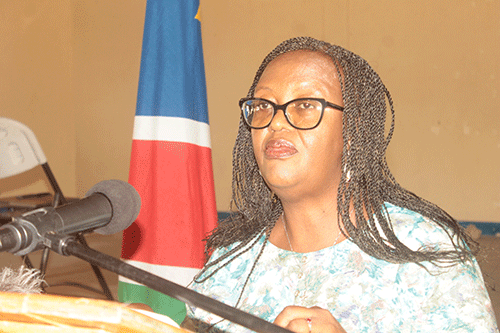NKURENKURU – Kavango West governor Sirkka Ausiku reports that more services have become available there over the past 10 years, as more institutions opened offices there but multidimensional poverty still haunts the region.
“I am happy to report that the Ministry of Industrialisation and Trade, GIPF and Nored are the latest to open their offices in the region. In the same vein, I am reminding the Ministry of Justice and other government agencies like Social Security Commission to follow suit, as they are denying our community the respective services,’’ she said while delivering her state of the region address (SORA) on Friday in Nkurenkuru.
“Most of the offices, ministries and agencies are renting office spaces from local business people and this helped stimulate our local economy,’’ she noted.
Apart from the presence of service delivery agents, Kavango West is still highly rural and poverty stricken, she noted that the region is guided by the available statistics from Namibia Statistics Agency (NSA) to describe and define its developmental state.
“The Namibia Multidimensional Poverty Index (MPI) Report launched in 2021, by National Planning Commission, examined poverty in 14 regions and found that multidimensional poverty in Kavango West region is the highest nationwide, at 79.6%. The region is highly rural with only Nkurenkuru town being the capital and economic centre and Katwitwi settlement,’’ she stated.
“The development of the region, as highlighted in this report, is still hampered by challenges such as poor road infrastructure like feeder roads, especially in the inland, inadequate water infrastructure, inadequate rural electrification, poor mobile communication networks in most parts of the region, inadequate educational and health facilities, among others,’’ she said.
Ausiku indicated that during the difficult periods such as the economic downturn, the prolonged drought and the outbreak of Covid-19, which affected the economy negatively, most programmes and projects in the region were put on hold although government continues to address these challenges.
“As a result, the development in our region has not been moving at a desired pace. The region will continue to highlight these challenges until they are addressed,” she said.
The governor, in her address, highlighted that the region has developed regional statistical baseline data, validated by NSA, providing statistical evidence on the current development stage of the region and benchmark future developmental programmes and projects which are cascaded to constituencies.
“Therefore, the region is appealing to all institutions to make use of the statistics and reports from Namibia Statistics Agency when making decisions on resource allocation for programmes and projects, as this process will lead to equity, fairness and achieve shared prosperity for all,” she said.
Ausiku said the region’s strategic development goals still remain the same which is focusing on agriculture, and that is because of the fertile land and a perennial river.
The region is looking at manufacturing, value addition and tourism industry.
“This came from two documents developed by the region namely, the regional profile, as well as the regional economic investment opportunities. the region still believes that with good investment, these three sectors can deliver a positive impact and help create employment and address poverty, especially among our youth,’’ she said.



